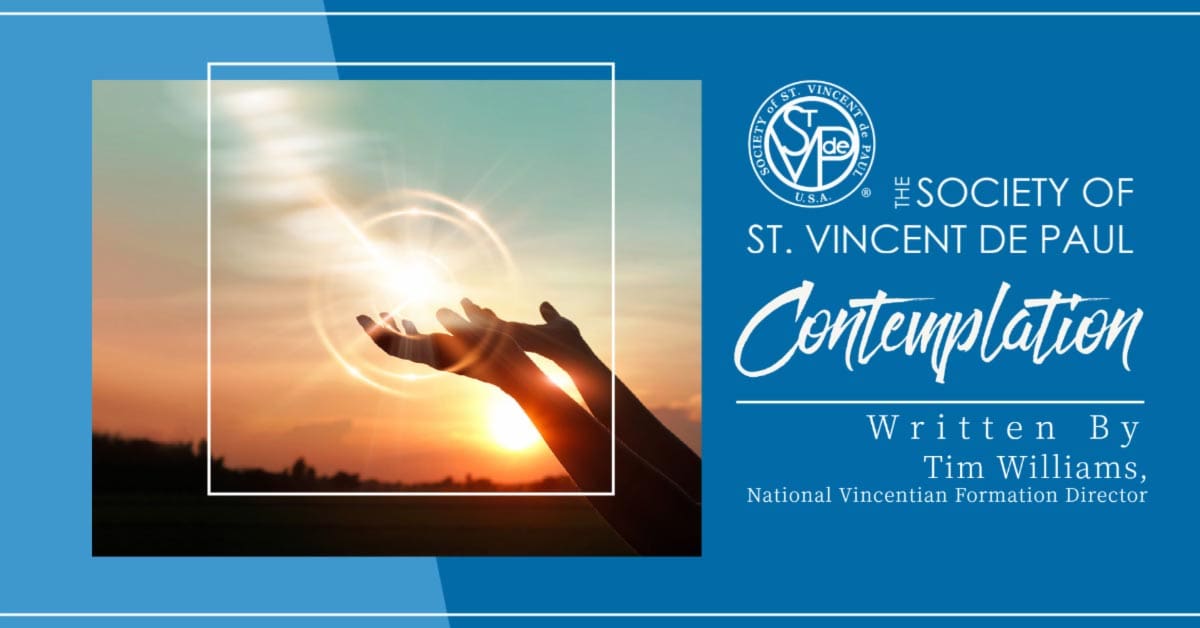We serve, our Rule reminds us, for love alone. [Rule, Part I, 2.2] This does not mean we do it in exchange for love, but rather that our works are motivated by love, and freely given as acts of love. Our own hearts, aflame with the love of God, cannot help but share this gift, to put the needs of another before our own. And although we do not seek it, it is the nature of the Divine love to always remain a gift, and one that will return to us only when we freely give it away.
This is why Bl. Rosalie Rendu taught her Daughters always to receive love with gratitude, even as we continue to give. “Love the fact that the poor love you,” she said. “If you have nothing to give, give yourself.” [Sullivan, 322] After all, if we seek God and serve God in the poor, then the love we receive from them is the love of God. As Bl. Frédéric Ozanam explained “in exchange for our love they will give us their prayers, and the blessing of the poor is a blessing from God.” [1457, Annual Report, 1834]
God’s love is given to us gratuitously; it is a gift, a grace which we can nether earn nor repay. Indeed, the words gratitude, gratuitous, and grace all stem from the Latin grātia, which refers to a favor or kindness – a gift. Like all things we receive from God – our talents, our comforts, our food and drink, our successes, our health, our very lives – God’s love is always offered back to Him, because it always remains of Him and in Him. He calls upon us to share His love with each other and with the neighbor, in whom we will find Him. He is not hidden from us. Rather, St. Vincent de Paul taught, “Wherever we go, we always find God. If He’s the one you seek, you’ll find Him everywhere.” [CCD X:416]
In so many areas of society, economics, and life, we observe cycles. Cycles of poverty, cycles of despair, cycles of violence – many of them vicious cycles, which end as they begin, ever renewing the despair or poverty with which they began. Like the ouroboros devouring its own tail, each is seemingly contained entirely within itself, perpetuating itself in its hopelessness.
Yet each of these is only one small part of a much greater and more powerful cycle of God’s creation, of life itself. Christ taught us not to despair over the troubles of the day, over the food we eat, or the clothes we wear. He taught us the power of God’s love through His own supreme sacrifice of love on the Cross, given with no thought towards repayment – as if there were any way for us to repay Him. He asks us, instead of reaping Him, to partake of Him, to receive His love and to share it with each other.
In the Eucharist, He remains truly present, continuing to give Himself, just as Bl. Rosalie calls on us to do. With each work of charity, of love, we both begin and perpetuate a great cycle of love, one that replaces poverty with gladness, and despair with hope. We do not give in order to receive, yet when we love, we are loved in return by God, through each other and the poor, and we are renewed.
Contemplate
While gratuitously sharing God’s love, do I remain always open to receiving it again?
By Timothy Williams,
Senior Director of Formation & Leadership Development
Society of St. Vicent de Paul USA.








0 Comments